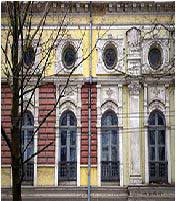How to Buy Real Estate In Moldova as a Foreigner
How high are realtors´ and lawyers´ fees in Moldova What about other property purchase costs?
How difficult is the property purchase process in Moldova?
Non-agricultural land can be freely bought and sold by anybody. However foreign citizens, companies, or states cannot buy agricultural and forest land, though they can lease short term (1 - 3 years), or long term (5 - 99 years).
All property transactions should be notarized and registered in the Real Estate Registry. The registration of the transfer of ownership of the property makes the transaction valid.
 Once a property has been chosen, the buyer´s solicitor needs to obtain a non-encumbrance certificate from the Cadastre. The seller then obtains the cadastral sketch certificate from the Territorial Cadastre Office. A sale/purchase agreement is then drafted and notarized for registration. It is advised that the buyer obtain a tax clearance certificate from the Tax Office to check for any tax liabilities of the real estate involved in the transaction. A public notary then executes the contract for deed transfer. Upon execution of the deed, the state tax is paid to the notary in cash. Finally, an application for the registration of title is submitted to the Territorial Cadastral Office for the transfer of ownership.
Once a property has been chosen, the buyer´s solicitor needs to obtain a non-encumbrance certificate from the Cadastre. The seller then obtains the cadastral sketch certificate from the Territorial Cadastre Office. A sale/purchase agreement is then drafted and notarized for registration. It is advised that the buyer obtain a tax clearance certificate from the Tax Office to check for any tax liabilities of the real estate involved in the transaction. A public notary then executes the contract for deed transfer. Upon execution of the deed, the state tax is paid to the notary in cash. Finally, an application for the registration of title is submitted to the Territorial Cadastral Office for the transfer of ownership.
Leases of real estate for a period less than three years must be registered at the mayor´s office where the leased property is located. The law does not require the notarization of (land) lease agreements.
Property registration requires five procedures and takes 4 to 10 days to complete.
What are the costs like when buying or selling a property in Moldova?
Transaction Costs |
||
| Who Pays? | ||
| State duty | 0.1% - 1% | buyer |
| Notary fee | 0.1% - 1.3% | buyer |
| Registration fee | 0.001% - 0.02% | buyer |
| Real Estate Agent Fee | 2% - 4% | seller |
| Costs paid by buyer | 0.20% - 2.32% | |
| Costs paid by seller | 2% - 4% | |
| ROUNDTRIP TRANSACTION COSTS | 2.20% - 6.32% | |
| See Footnotes Source: Global Property Guide |
||
Footnotes to Transaction Costs Table
The round trip transaction costs include all costs of buying and then re-selling a property - lawyers´ fees, notaries´ fees, registration fees, taxes, agents´ fees, etc.

 State Duty
State Duty
State duty is levied at 0.1% for land transactions, and at 1.00% on the property or building transactions. The tax base is the selling price or the market value of the property.

 Notary Fee
Notary Fee
Notary fees are charged on a sliding scale.
NOTARY FEES |
|
| VALUE OF THE PROPERTY MDL (€) |
RATE |
| Up to 20,000 (€909) | 1.30%, but not less than MDL120 (€8) |
| 20,000 - 50,000 (€2,273) | 1.0% |
| 50,000 - 100,000 (€4,545) | 0.90% |
| 100,000 - 200,000 (€9,091) | 0.80% |
| 200,000 - 400,000 (€18,182) | 0.60% |
| 400,000 - 600,000 (€27,273) | 0.50% |
| 600,000 - 800,000 (€36,364) | 0.30% |
| 800,000 - 1,000,000 (€45,455) | 0.20% |
| Over 1,000,000 (€45,455) | 0.10% |

 Registration Fee
Registration Fee
Registration fees vary depending on the expediency of the service. Regular version or normal option takes 10 calendar days and costs 0.06% of the property value, but not less than MDL267 (€12) and not more than MDL1,335 (€67). The cost is 3 times more for the fast option that takes 5 calendar days (or 0.18%), and 5 times more for the fastest option that takes 3 calendar days (or 0.30%).
There are cases when Territorial Cadastre Offices accept the registration of sale/purchase agreements which are not notary-certified, especially when the Parties are assisted by a lawyer.